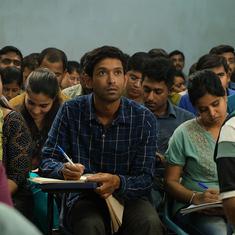Vivek Soni’s Aap Jaisa Koi stars two camera-friendly actors trying to pass themselves off as laggards in love. R Madhavan is Shrirenu, a 42-year-old virgin who has never managed to find a partner. Fatima Sana Shaikh is Madhu, a 32-year-old non-virgin who has loved and lost.
Neither actor looks like the sort of person who has trouble getting it on, but a movie has to be made on the opposites-attract principle, so here we are.
Shrirenu and Madhu establish a rapport despite being surrounded by the binaries that flourish in romantic dramas, if only to create false tension. He is from Jamshedpur, she is from Kolkata. He teaches Sanskrit, she, French. He is strait-laced, she’s free-spirited. It is pointed out that “if you only read Sartre and not Kalidas you are missing something”.
Their mutual passion is doused by a discovery that reveals Shrirenu’s limitations. Nobody can blame Madhu for wanting to walk away from the bookish and deadly dull Shrirenu. To give Shrirenu his due, Madhu isn’t terribly interesting either.
Writers Radhika Anand and Jehan Handa persevere, coming up with ways to flog the supposed differences not just between Shrirenu and Madhu but also their families. But Aap Jaisa Koi, like Vivek Soni’s previous film Meenakshi Sundareshwar (2021), struggles to justify itself. Shrirenu’s sister-in-law, the put-upon Kusum (Ayesha Raza), has the only promising track in a film that barely gets going.
The Netflix release has a few soothing tunes by composer Justin Prabhakaran and magic realist scenes that enliven the pervasive dullness. There is some initially sharp character shading of Shrirenu, who’s clueless about how clueless he is. He wishes that his pet mouse will find a partner soon, unable to see that the poor rodent is in a cage.
The feeling of being trapped in socially sanctioned roles, the oppressiveness of family ties, the conservatism that influences Shrirenu’s thinking – none of these quite come through. Perfectly made-up characters in heavily art directed surroundings enact a pantomime of self-realisation, emancipation and redemption. One of the most inspired moments comes in the end credits, which are based on Kalighat paintings.










